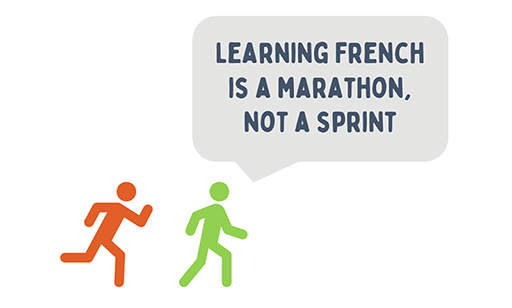4 Finding time to learn French
‘How will I find the time?’ is a question that prospective students will usually ask themselves at some point. This section will help you think about the best ways to make time for you.
Was ‘becoming fluent’ one of your motivations for learning French? Or maybe obtaining a degree in the language? These are really great ambitions, but it’s important to realise as a beginner that becoming fluent in any language does not happen overnight. This level of success comes with commitment over a number of years. Of course, your ambition might be gaining conversational French skills rather than obtaining qualifications – this is a fantastic goal that will nevertheless require time and effort. The good news is that whatever your goal may be, you’ll develop the competency to ‘get by’ in French relatively quickly. What’s more, you will notice your clear progress developing over time. Of course, if you aren’t aiming to become a perfectly fluent speaker, you will learn enough French to meet your goals in a shorter period of time. What you need to do is consider the likely timeframes for meeting your goals, and plan accordingly.
The most important thing to remember is that language learning is a marathon, not a sprint. You will build your skills piece by piece, over the long term, through much practice and repetition. Did you ever ‘cram’ just before an exam when you were at school? Perhaps you had a list of historical dates, or set of mathematical formulas, and you went over them again and again, in the hope they’d be fresh in your mind for a while. Unfortunately, that will not work with French! (It may not have worked with the subject you were studying either!)
Here’s another way of thinking about this learning journey. Imagine a young relative is desperate to learn to drive, because she wants to visit friends in a far away town. She has her provisional licence. Would you accompany her on the motorway for a practice journey? Apart from this being illegal, what other reasons would you give for saying ‘no’? She needs to realise that driving skills are accomplished with time, understanding and practice. Likewise, you wouldn’t take a novice skier straight to the top of a black run, or take somebody who can’t swim into the deep end of the pool. Learning a language is similar.
Perhaps you’ve had some similar learning experiences before. Use the activity below to explore this.
Activity 4 Strategies for success
Think back to something you’ve achieved which required time and effort (e.g. passing your driving test, gaining qualifications, learning an instrument, joining a sports team, starting yoga classes). What was this experience like? Consider these questions.
- What difficulties did you face?
- How did you control your environment to help you successfully complete the task?
- What strategies did you develop to be successful?
So, given that you’ll need to dedicate time to your learning, what will be the best method of study for you? There are various options available: an evening class; a distance learning course (like those offered by The Open University); French language books, mobile applications and online resources. Or a combination of all of these! They each have potential advantages and disadvantages, so you should consider your preferences.
Focus, discipline and motivation will be important tools in commencing your studies and staying committed to them, whichever method of study you choose. Keep that original motivation in mind as you decide how you’d like to study.
Finally, share your plans with friends and family. Support and encouragement from those around you goes a long way. Often it’s sticking with language learning over a long period of time that is the hardest thing of all. This is not necessarily because you lose interest and want to give up – it’s because unexpected things happen in life. You need to factor in other demands that could crop up, in your social life, at work, or other personal commitments. Consider this as you plan your method of study and your allocation of time, and think about the ways you might draw on your support network to help you succeed.
To summarise:
- learning French takes time, but you can learn enough to get by quickly
- learning French is a marathon, not a sprint, and ‘little and often’ is the best way to learn a language
- choose the method of study that suits you best
- plan your study time to fit your circumstances, and share your aims with your friends and family.

